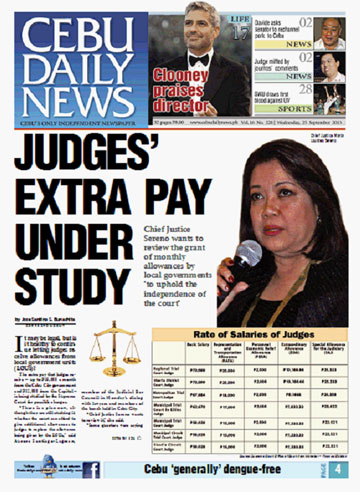
The extra pay that judges receive - up to P35,000 a month from the Cebu City government and P12,000 from the Capitol is being studied by the Supreme Court for possible changes.
“There is a plan now, although they are still studying it, whether the court can afford to give additional allowances to judges to replace the allowance being given by the LGUs,” said Aurora Santiago-Lagman, member of the Judicial Bar Council in Monday’s dialog with lawyers and members of the bench held in Cebu City.
“Chief Justice Sereno wants to review it,” she said.
“Some quarters were saying these allowances may affect the independence of judges receiving them.”
But Lagman said the practice cannot be immediately stopped since the High Court doesn’t have an alternative yet to replace it.
The topic was raised by Cebu Daily News columnist Malou Guanzon Apalisok during the JBC’s Dialogue with Stakeholders in the Visayas held at Radisson Blu.
Apalisok cited the August conviction of broadcaster and columnist Leo Lastimosa for libel.
“There are a lot of questions whether the allowance that the judge has accepted from the Cebu provincial government was a factor in the decision. I’m not making any accusation or questioning the verdict on a colleague. I’d like to hear it from your honors, what do you think of this particular issue?” she asked the JBC members.
Lagman replied that Chief Justice Sereno was reviewing the whole system of allowances from LGUs in order to “uphold the independence” of the courts.
She said Sereno was looking into a proposal to establish a “common fund” from budgets allocated by LGUs as assistance to judges and to “rationalize” its use so that “it benefits the judiciary as a whole and not a select few”.
She said this would have to be discussed closely with the Court Administrator, who supervises courts nationwide.
At the start of the dialog, JBC members from Manila encouraged qualified lawyers to apply for vacancies in the judiciary, saying it was a fulfilling work as public service.
Lagman emphasized criteria of competence, integrity and independence.
The JBC is “the gatekeeper of the judiciary” and is looking for “the best and the brightest” she said as she assured that their recommendations to the President are based on merit and a stringent screening process of applicants.
Lagman, who emphasized the criteria of “integrity” as the most difficult measure to check, singled out Associate Justice Gabriel Ingles of the Court of Appeals Cebu as an example of this virtue.
She said that when she interviewed him for the post, she was impressed by his statement that he had chosen not to receive the monthly allowance of the Cebu city government.
“That was the first time I heard a judge refuse to accept an allowance from an LGU,” she said.
Ingles remains one of the few judges in Cebu who declines to receive a monthly allowance from the Capitol or City Hall to avoid potential situations of conflict of interest when a case is brought before him by a local government.
Under Article III, Sec. 458 of the Local Government Code of 1991, LGUs can, when its finances allow, “provide for additional allowances and other benefits to judges, prosecutors, public elementary and high school teachers, and other national government officials stationed or assigned to the city.”
Each Municipal Trial Court in Cities (MTCC) judge is presently receiving a monthly stipend of P30,000 from the Cebu City government while each Regional Trial Court (RTC) judge in Cebu City receives P35,000 from the city government and P12,000 from the Capitol.
Another JBC member Milagros Fernan-Cayosa, said that Chief Justice Sereno had mentioned, in one of their discussions, that she wants to reexamine the policy of allowing the justices to receive allowances from LGUs, “simply because we would not want this to be a reason for them to lose their independence.”
One plan was to create a “common fund” where budget from LGUs that were already set aside can be placed.
“To rationalize it, if the LGU has provided it in their budget, how this can be used so that it will benefit the judiciary as a whole not just certain individuals,” Cayosa said.
JBC member Jose Mejia pointed out that a proper perspective on the allowances can help judges retain their objectivity.
“We should understand that this money is still taxpayers money. Hindi po to nanggagaling sa bulsa ng mayor or governor. Nanggagaling po ito sa taong bayan (It doesn’t come from the pockets of mayors and governors. It comes from the people). Maybe if we look of it that way, we can be more objective,” Mejia said.
Mejia earlier said judges are already receiving good salaries and benefits, and showed a table of figures.
RTC judges get a basic salary of P73,000, representation and transportation (RATA) allowance of P20,000, personal economic relief allowance (PERA) of P2,000, extraordinary allowance (EOA) of P10,000 and special allowance for the judiciary (SAJ) of P25,000.
Metropolitan Trial Court Judges get a basic salary of P67,000, RAT allowance of P18,000, PERA of P2,000, EOA of P9,000 and SAJ od P24,000.
For MTCC judges, they get P62,000 basic salary, RATA allowance of P17,000, PERA of P2,000, EOA of P7,000 and SAJ of P23,000.
Meanwhile Municipal Trial Court judges get P58,000 basic salary, P15,000 RATA allowance, P2,000 PERA, P7,000 EOA and P22,000 SAJ.